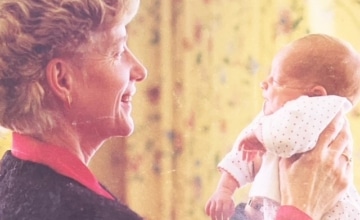Just as infants and young children develop in the context of relationships, change happens in the context of relationships. As someone interested in IECMH, think about spreading the word on IECMH.
by Julie Cohen, Associate Director, ZERO TO THREE Policy Center
Members of ZERO TO THREE understand the connection between nurturing relationships and infant development. But what do nurturing relationships have to do with improving policy—the rules and regulations that guide infant and early childhood mental health (IECMH) services?
Early childhood professionals know that early relationships matter—a lot. Babies’ earliest relationships and experiences shape the architecture of the brain. Babies who engage with responsive, consistent, and nurturing caregivers are more likely to have strong emotional health, or, IECMH. When it comes to working with babies, toddlers, and their families, how we are is as important as what we do. At ZERO TO THREE, we apply this same approach to policy and advocacy.
A relationship-based approach to policy and advocacy means that we get to know the policy leaders, and their staff, long before we approach them with a specific “ask” (a request for a budget item or change in rules, regulations, or laws). We listen to their perspectives, what’s important to them and their constituents, and the priorities that drive their decision-making. We find out how familiar they are with infant-toddler issues and whether they’ve ever heard of IECMH. And then we begin our process of raising their awareness and educating them about early childhood policy issues.
Most legislators, agency directors, and other policymakers are not familiar with IECMH, and if they are, IECMH competes with many other priority issues—health care reform, tax reform, state budget deficits, disaster relief, etc. Policymakers may be aware that brain development happens in the first years of life, but do they know that IECMH is directly linked to the formation of a child’s brain architecture, shaping neural connections and pathways through repeated experiences and early relationships? Do our decision makers know that IECMH is the cornerstone of healthy development, providing the foundation upon which all future development rests including physical growth, health, cognitive skills, and communication?
Given all the competing issues, policymakers need a compelling reason to take action on IECMH. They need information about the potential benefits of early identification and the expected “pay off” or return on investment, and they need to hear directly from families (their constituents) about the value of services and supports. Policymakers also need to see how investments in IECMH can affect their other priorities. For example, access to high-quality child care translates into better employment opportunities in communities that can attract young families and create a stronger economy. Improving early identification and treatment of mental health disorders prevents more serious and costly mental illness later on. And of course, school success factors such as self-confidence, curiosity, persistence, self-control, and trust have their roots in infancy, and policies such as paid parental leave allow families to establish secure, healthy relationships with their babies.
It is important to note that IECMH disorders can occur in children irrespective of parenting practices, socioeconomic status, health care, or family support. Research shows that when these disorders occur, regardless of their source, their effects can be at least ameliorated with timely and effective interventions. Unfortunately, only a small percentage of children who need mental health treatment actually receive it. When disorders are left untreated, they can impact every facet of a child’s development—physical, cognitive, communication, sensory and motor skills, emotional resiliency, and social—and in turn, a child’s ability to succeed. And if not addressed in early childhood, IECMH disorders can impact functioning into adulthood, including effects on success in the workforce and in relationships.
Just as infants and young children develop in the context of relationships, change happens in the context of relationships. As someone interested in IECMH, think about spreading the word on IECMH. Everyone has a sphere of interest. Figure out what your sphere is and use it! If you work at the state level, build a relationship with your state children’s mental health director. Volunteer to be your agency’s representative to offer the early childhood perspective on a mental health or Medicaid workgroup. Talk with the state staff working in child care, early intervention, home visiting, and child welfare. If you work at the local level, you can talk with a preschool director or local elementary school principal. Visit your local library and offer to help identify a display of children’s books on feelings. Each of these interactions is a way to create a relationship and make improvements in IECMH. Meet with these decision-makers to learn what is being done in their respective areas to support young children’s mental health. Have an informal conversation. Build a relationship. Offer to be a resource to them. Help educate them on the critical importance of early relationships and consistent care.
Changes in policy and practice start with building relationships with individuals who have the power to make decisions. Share information in clear simple terms. Your message matters. Help policymakers understand that infants and young children have mental health needs.
ZERO TO THREE has developed a series of short briefing papers to help you in your work. These papers can be used to raise awareness, interest, and action among state policymakers, mental health providers, advocates, and early childhood providers. Bring one of the papers with you and leave it with the person you are trying to influence. Topics include:
- The Basics of Infant and Early Childhood Mental Health
- DC: 0–5™: Diagnostic Classification of Mental Health and Developmental Disorders of Infancy and Early Childhood
- DC:0–5™ Crosswalk
- Infant and Early Childhood Mental Health Consultation
- Infant and Early Childhood Mental Health Competencies (Coming Soon!)
If you are taking action to advance IECMH in your state or community, please share your policy stories with us! Share your successes. Share your struggles. Please let us know how we can help at policycenter@zerotothree.org.
Remember, everyone has a sphere of interest. Figure out what your sphere is and use it! We all need to work together to advance IECMH—one relationship at a time.





